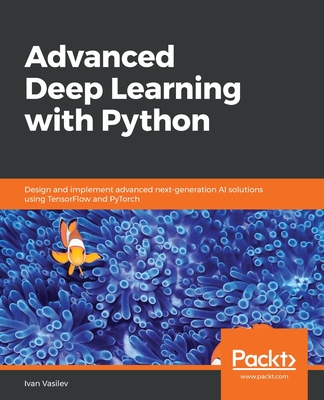Deep Learning on Embedded Systems
暫譯: 嵌入式系統上的深度學習
Arif, Tariq M.
- 出版商: Wiley
- 出版日期: 2025-04-15
- 售價: $3,370
- 貴賓價: 9.5 折 $3,202
- 語言: 英文
- 頁數: 256
- 裝訂: Hardcover - also called cloth, retail trade, or trade
- ISBN: 1394269269
- ISBN-13: 9781394269266
-
相關分類:
嵌入式系統、DeepLearning
尚未上市,無法訂購
相關主題
商品描述
Comprehensive, accessible introduction to deep learning for engineering tasks through Python programming, low-cost hardware, and freely available software
Deep Learning On Embedded Systems is a comprehensive guide to the practical implementation of deep learning for engineering tasks through computers and embedded hardware such as Raspberry Pi and Nvidia Jetson Nano. After an introduction to the field, the book provides fundamental knowledge on deep learning, convolutional and recurrent neural networks, computer vision, and basics of Linux terminal and docker engines. This book shows detailed setup steps of Jetson Nano and Raspberry Pi for utilizing essential frameworks such as PyTorch and OpenCV. GPU configuration and dependency installation procedure for using PyTorch is also discussed allowing newcomers to seamlessly navigate the learning curve.
A key challenge of utilizing deep learning on embedded systems is managing limited GPU and memory resources. This book outlines a strategy of training complex models on a desktop computer and transferring them to embedded systems for inference. Also, students and researchers often face difficulties with the varying probabilistic theories and notations found in data science literature. To simplify this, the book mainly focuses on the practical implementation part of deep learning using Python programming, low-cost hardware, and freely available software such as Anaconda and Visual Studio Code.To aid in reader learning, questions and answers are included at the end of most chapters.
Written by a highly qualified author, Deep Learning On Embedded Systems includes discussion on:
- Fundamentals of deep learning, including neurons and layers, activation functions, network architectures, hyperparameter tuning, and convolutional and recurrent neural networks (CNNs & RNNs)
- PyTorch, OpenCV, and other essential framework setups for deep transfer learning, along with Linux terminal operations, docker engine, docker images, and virtual environments in embedded devices.
Training models for image classification and object detection with classification, then converting trained PyTorch models to ONNX format for efficient deployment on Jetson Nano and Raspberry Pi.
Deep Learning On Embedded Systems serves as an excellent introduction to the field for undergraduate engineering students seeking to learn deep learning implementations for their senior capstone or class projects and graduate researchers and educators who wish to implement deep learning in their research.
商品描述(中文翻譯)
全面且易於理解的深度學習介紹,適用於透過 Python 程式設計、低成本硬體和免費軟體進行工程任務
嵌入式系統上的深度學習 是一本全面的指南,介紹如何在工程任務中實際應用深度學習,透過電腦和嵌入式硬體,如 Raspberry Pi 和 Nvidia Jetson Nano。書中在介紹該領域後,提供了深度學習、卷積神經網絡和遞迴神經網絡、計算機視覺以及 Linux 終端和 Docker 引擎的基本知識。本書詳細說明了 Jetson Nano 和 Raspberry Pi 的設置步驟,以便利用 PyTorch 和 OpenCV 等基本框架。還討論了使用 PyTorch 的 GPU 配置和依賴安裝程序,讓新手能夠順利克服學習曲線。
在嵌入式系統上使用深度學習的一個主要挑戰是管理有限的 GPU 和記憶體資源。本書概述了一種策略,即在桌面電腦上訓練複雜模型,然後將其轉移到嵌入式系統進行推斷。此外,學生和研究人員經常面臨數據科學文獻中不同的概率理論和符號所帶來的困難。為了簡化這一點,本書主要專注於使用 Python 程式設計、低成本硬體和免費軟體(如 Anaconda 和 Visual Studio Code)進行深度學習的實際實施。為了幫助讀者學習,大多數章節的末尾都包含問題和答案。
本書由一位高素質的作者撰寫,嵌入式系統上的深度學習 包含以下討論主題:
- 深度學習的基本原理,包括神經元和層、激活函數、網絡架構、超參數調整,以及卷積神經網絡和遞迴神經網絡(CNNs 和 RNNs)
- PyTorch、OpenCV 及其他深度遷移學習的基本框架設置,以及嵌入式設備中的 Linux 終端操作、Docker 引擎、Docker 映像和虛擬環境。
訓練圖像分類和物體檢測的模型,然後將訓練好的 PyTorch 模型轉換為 ONNX 格式,以便在 Jetson Nano 和 Raspberry Pi 上高效部署。
嵌入式系統上的深度學習 是一本出色的入門書籍,適合尋求學習深度學習實施的本科工程學生,無論是為了他們的畢業專題或課堂項目,還是希望在研究中實施深度學習的研究生和教育工作者。
作者簡介
Tariq M. Arif, PhD, is an Associate Professor at WSU since 2019. Prior to that, he worked at the University of Wisconsin, Platteville. His primary research interests include artificial intelligence and genetic algorithms for robotics control, computer vision, and biomedical simulations involving machine learning algorithms. He also worked in the Japanese automobile industry for three and a half years as a CAD/CAE engineer.
作者簡介(中文翻譯)
Tariq M. Arif, PhD, 自2019年起擔任華盛頓州立大學的副教授。在此之前,他曾在威斯康辛大學普萊特維爾校區工作。他的主要研究興趣包括人工智慧和用於機器人控制的遺傳演算法、計算機視覺,以及涉及機器學習演算法的生物醫學模擬。他還曾在日本汽車產業擔任CAD/CAE工程師,工作了三年半。































